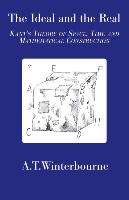"The Ideal and the Real should prove valuable to two particular sets of readers: (i) those with an interest in Kant and little or no background in the philosophy of mathematics, or (ii) those with an interest in the philosophy of mathematics and little or no background in Kant...The book contains much that is suggestive which should promote further discussion...(and) offers more than a simple examination of Kant's philosophy of mathematics. Of particular interest is his suggestion that Newton's thought experiments have been changed and idealized by commentators." R.R.Wojtowicz, (Canadian Philosophical Review) This book argues that Kant's theory of space, time and mathematics has contemporary significance principally because of its roots in the ideas of construction and schematism. These concepts are analysed in the light of the central Kantian distinction between the ideal and the empirically real. A reassessment of Newton's arguments for absolute space is followed by an examination of Leibniz's theory of space, time and continuity. The metaphysical frameworks of these theories are presented as essential precursors of Kant's critical programme. The ideas of construction and schematism illuminate all aspects of Kant's philosophy of mathematics, and have important implications for understanding both the task and the achievement of the critical philosophy. Through an analysis of these concepts, the role of intuition, and in particular the argument from incongruent counterparts, is given added significance. "While he intends The Ideal and the Real as a limited commentary on space, time, and mathematical construction, it also brings the reader into contact with a whole series of problems treated by Kant in the First Critique and the Prolegomena....While the discussion of Newton displays a sensitivity to the complexity of Newton's position, Winterbourne's own exposition develops clearly....(and) advances with such sensitivity both to primary and secondary sources that one could hardly find a better summary of the issues surrounding the Leibniz-Clarke controversy....The discussion of incongruent counterparts provides the most interesting part of the monograph....Winterbourne avoids technical jargon and obscure explanation in an admirable way...(and) gives us one of the best treatments of the Schematism available. Kantian scholars would do well to take note of Winterbourne's conclusions." John Treloar, (The Modern Schoolman) "One of the main strengths of Winterbourne's book is his treatment of Kant's philosophy of mathematics....and (it) offers an interesting overview of the ideas of Leibniz and Newton..." Grant West (Isis)
|




